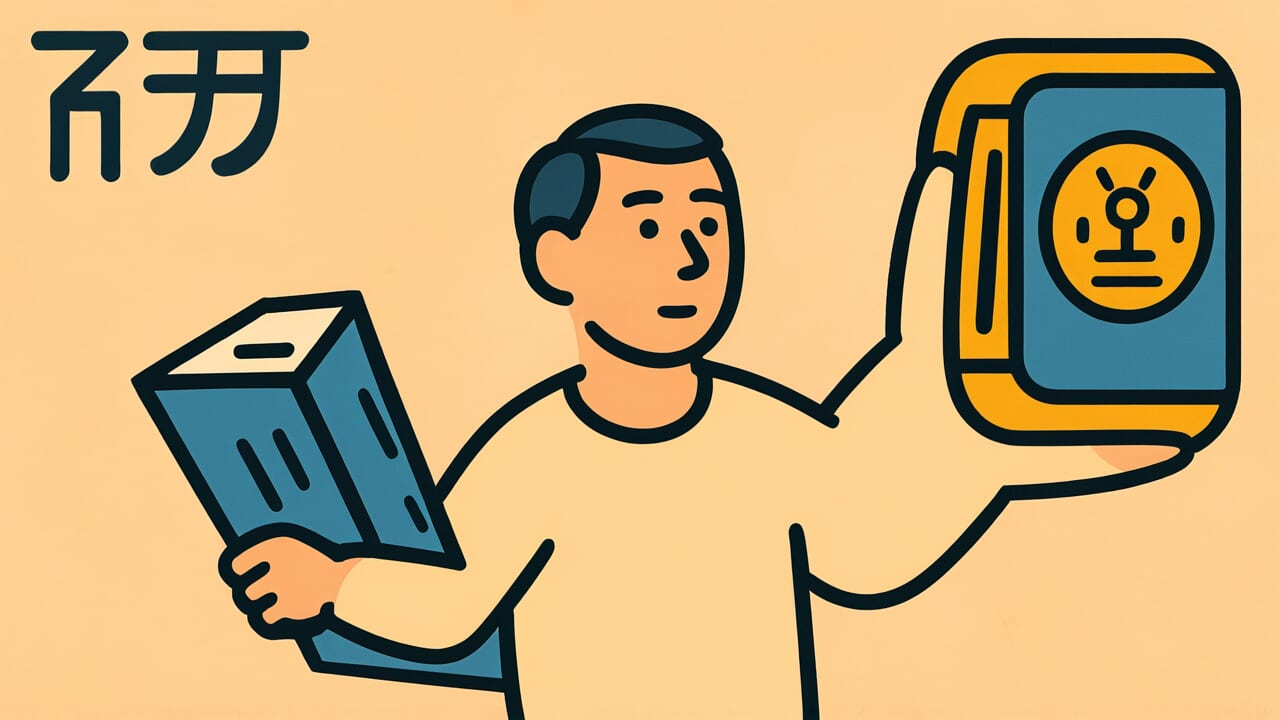How to Read “Wisdom and strength are not a burden”
chie to chikara wa omoni ni naranu
Meaning of “Wisdom and strength are not a burden”
This proverb means that knowledge and skills never become a burden when you acquire them. Instead, they become treasures.
Physical luggage gets harder to carry the more you have. But wisdom in your mind and skills in your body never feel heavy, no matter how much you gain.
People use this proverb to encourage someone who hesitates to learn or train. It’s also used when you want to convey the value of effort.
The message is hopeful: “It might be hard now, but what you learn will never be wasted.”
Today, people often quote this proverb when talking about self-investment. This includes getting certifications, learning languages, or acquiring new skills.
Knowledge and skills can’t be stolen. They can’t be lost. They don’t fade with age.
In fact, they become more valuable when combined with experience.
Origin and Etymology
The exact origin of this proverb is unclear. However, the structure of the phrase offers interesting insights.
Notice how it pairs two elements: “wisdom” and “strength.” This combination is meaningful.
Japan has long had a phrase called “bunbu ryodo,” which means excelling in both literary and martial arts. Japanese culture has always valued both intellectual and physical abilities.
Wisdom refers to knowledge gained from learning and experience. Strength points to technical skills and physical power.
The phrase “are not a burden” shows how these differ from material possessions.
Consider life during the Edo period. This makes the proverb’s meaning clearer.
Back then, owning many things made moving difficult. During disasters like fires, possessions could even cost you your life.
But knowledge and skills never hindered carrying. No matter how much you acquired, they caused no trouble in transport.
Better yet, they became treasures that helped you wherever you went.
In the world of craftsmen, there’s another saying: “Skills save your life.” Once you mastered a technique, it became a lifelong treasure.
This proverb likely emerged from such practical life wisdom. It contains our ancestors’ insight that intangible wealth is the most reliable wealth.
Usage Examples
- Studying for certifications is tough, but wisdom and strength are not a burden, so I’ll keep trying
- Learn many things while you’re young, because wisdom and strength are not a burden
Universal Wisdom
This proverb addresses a fundamental question: What is true wealth for human beings?
We tend to seek visible possessions. But our ancestors understood the value of intangible wealth.
Life brings unexpected changes. You might move to a new place. Society might transform overnight.
When this happens, material possessions can be lost or lose their value. But knowledge and skills you’ve acquired stay with you in any situation.
There’s a deeper insight here. Wisdom and strength “enrich your life more as they increase.”
Too many physical things become hard to manage. They actually become burdens.
But knowledge and skills work differently. The more you have, the more choices you gain. They become power to overcome difficulties.
This proverb has been passed down for generations. It expresses a universal desire for human growth and self-realization.
We instinctively want to improve ourselves. We want to become better versions of ourselves.
This saying gives us hope that such efforts are never wasted.
When AI Hears This
From an information theory perspective, wisdom and strength aren’t burdens because they’re “information” without physical mass.
For example, carrying 10 kilograms of rice requires twice the energy if the distance doubles. But knowledge and skills stored in your brain don’t increase brain weight, no matter how much you accumulate.
Even more interesting is information’s “non-consumable” nature. Physical resources decrease when used. But wisdom doesn’t decrease when used.
It actually becomes more refined with use. If you use cooking skills once, those skills don’t disappear. You can use them again next time.
This is a unique property of information that transcends physical laws.
What’s truly amazing is the explosive value increase from combining information. If you have 10 pieces of knowledge, the combinations number in the hundreds.
Combine math knowledge with cooking knowledge, and you create new value: recipe optimization.
Information theory calls this “entropy additivity.” When you integrate separate information, you generate more than simple addition.
In other words, wisdom and strength are special “assets” that don’t exist in the physical world. The more you have, the lighter they become.
The more you use them, the more they increase. When combined, their value grows exponentially.
Lessons for Today
This proverb teaches modern people the importance of self-investment. In our rapidly changing era, portable wealth like knowledge and skills becomes more valuable.
Specifically, start by letting go of hesitation about learning new things. Excuses like “It’s too late” or “I don’t have time” might actually create missed opportunities.
Online learning and skill development opportunities are more accessible than ever before.
What matters is shifting perspective. See learning as “investment,” not “burden.”
What you learn today will help you tomorrow. And it becomes your treasure that no one can take away.
In this era of 100-year lifespans, continuous learning has become a lifelong task. But there’s no need to fear.
Wisdom and strength are not a burden. Rather, the more you learn, the more your life choices expand.
Your possibilities keep opening up.



Comments